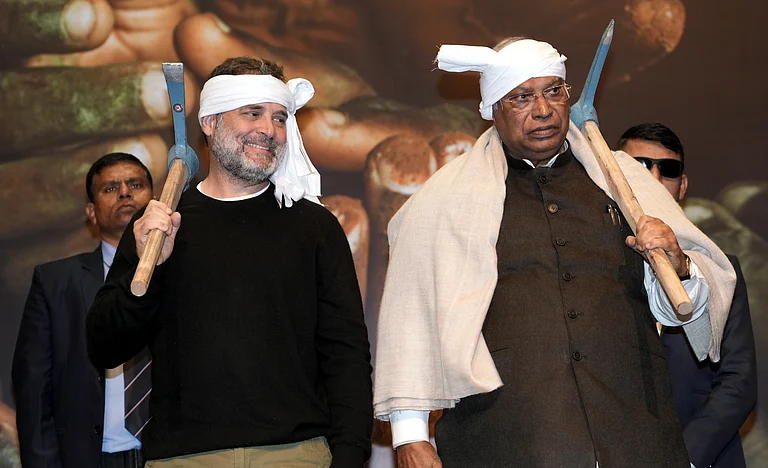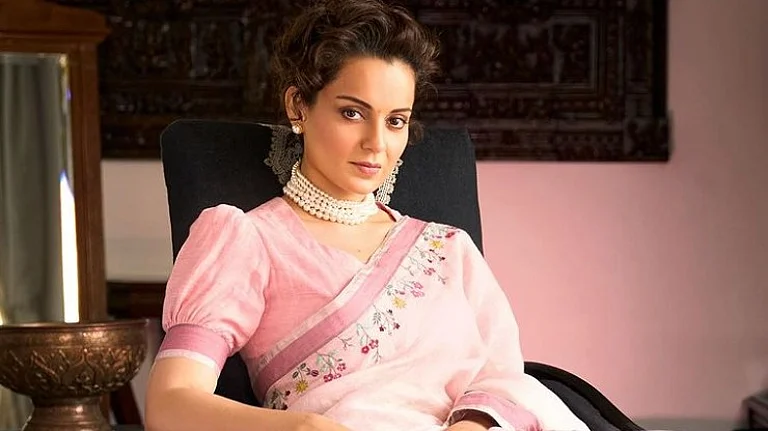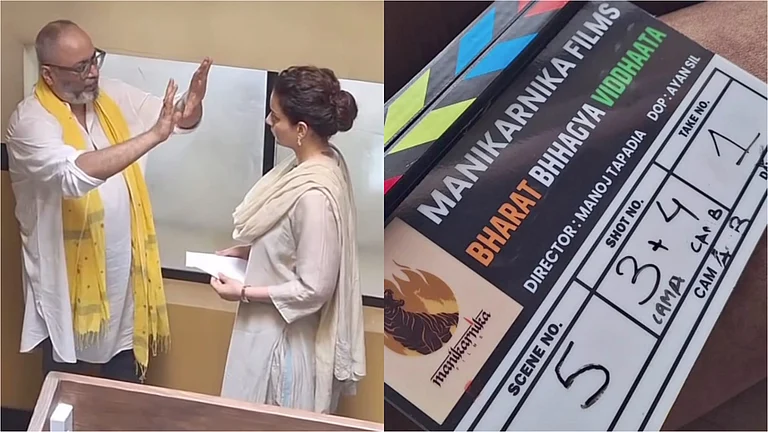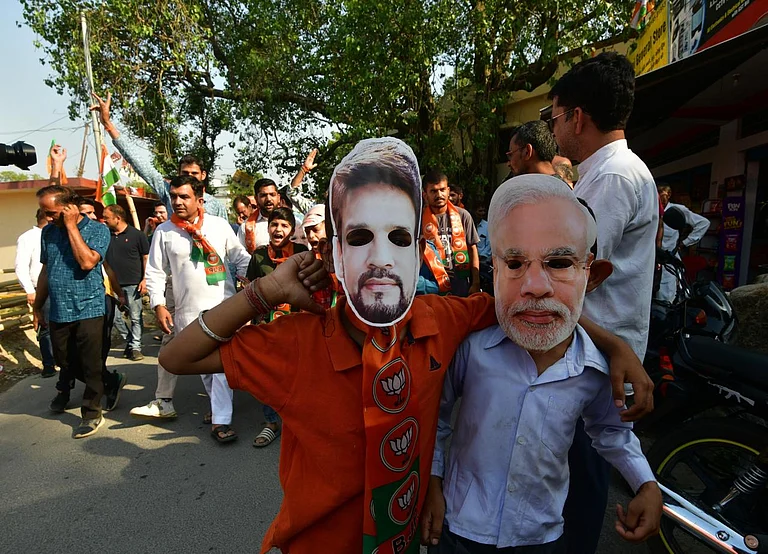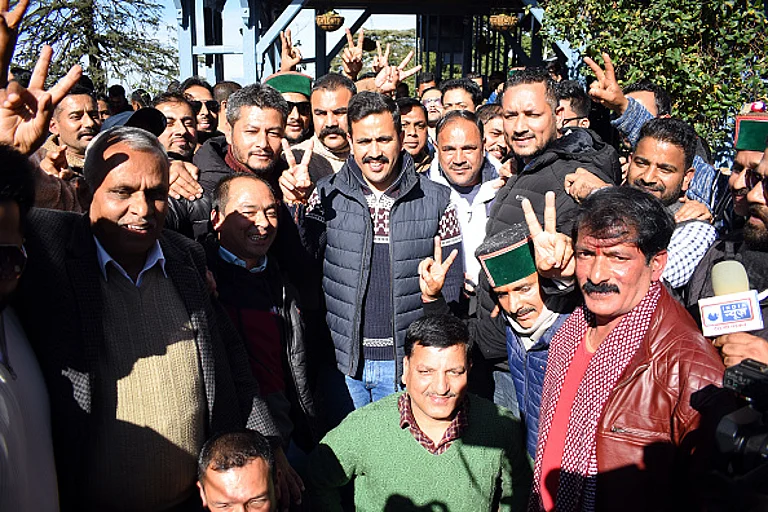The students of Krishma Educational Centre, a B.Ed. college in Mandi, fill a hall that mirrors their careers: under construction. Asbestos sheets, window panes, and long pipes litter its far end. A Jai Shree Ram flag flutters in the backyard. The students chat, banter, laugh. “How will you clap when she comes?” A female teacher asks. They applaud in a musical rhythm. She approaches a different row: “You’ve to raise slogans as well.” When the politician arrives, the students implement the instructions: they clap, whistle, and scream “Jai Shree Ram”. In Kangana Ranaut’s hometown, everyone is an actor.
Nine days before the polls, her urgency is palpable. “How many of you’ve voted before? Raise your hands.” More than half of them do. “Bahut badhiya [very nice].” She cautions them against complacency, as the conflict-ridden states—such as “Manipur, Jharkhand, and Bengal”—show a high voter turnout, but the states, “happy with Modi-ji’s schemes”, don’t. “You must phone everyone and urge them to vote for the Bharatiya Janata Party [BJP]. And if they ask, ‘Why do you care?’ Say, ‘I work for the BJP.’”
Even though Ranaut speaks in a commanding voice, she belabours the voter-turnout point in her short speech and pauses across words, as if charging her memory, while referencing the names and numbers related to welfare schemes. When the students applaud, she looks relieved. Moderating her own fire, she delivers a speech that functions as an ‘opening act’: “Two days later, the country’s biggest superstar, Narendra Modi-ji,will visit Mandi. You’ve to listen to his speech at 2 pm.” Ninety minutes later, standing in front of a house, Ranaut rubbishes the INDIA alliance and praises Modi. “Talking about him is like showing a lamp to the sun.” She still goes on—and on—about his virtues. She takes a dig at Rahul Gandhi (a “cartoon character”); the audience laughs. Even when she sounds confident, her speech remains generic and broad, devoid of her plans as an MP.
For the BJP, though, safe is better than embarrassing, as she’s made remarkable gaffes in the recent past, from calling “Subhas Chandra Bose, the country’s first prime minister” to slamming her BJP colleague, Tejasvi Surya, instead of Tejashwi Yadav. But Ranaut need not shrink herself, as her own journey—from an actor to a politician (minus the hate speech)—has been fascinating. From conquering a film industry loaded with dynasts, she’s come to a constituency ... loaded with dynasts. She’s up against the Congress party’s Vikramaditya Singh, the son of the six-time chief minister Virbhadra Singh, who hails from a royal family. A ‘king’ battling a ‘queen’.
“She’s bold and dynamic,” says Subhash Malhotra, a hotel owner. Ranaut’s parents forbade her from entering Bollywood, so “she revolted and left for Bombay, where she made it on her own”. Two decades later, in politics, she countered her family again: “Her father was a Congressi.” Around 20 km away, in Darang, Narmada Thakur says, “I’m proud of her. She’s made Mandi and Himachal famous.” Thakur calls her “sangharsh-sheel” and “himmat-daar”—a courageous fighter—who achieved a lot at a young age. “And when it comes to politics, she’ll learn. It’s not a big deal.” Bhagat Ram agrees: “She’s made Mandi proud. She achieved so much in Bombay—it’s not possible for a common person.”
The Mandi Lok Sabha constituency, divided into five districts, covers more than half of Himachal Pradesh. In the 2022 state elections, which brought the Congress back to power, the BJP won 13 out of 17 Vidhan Sabha seats in Mandi—and all 9 in the Mandi district. “The Congress won only because of the Old Pension Scheme,” says Malhotra. The party had released ten guarantees in its election manifesto. “Those were just promises,” says Manoj Kumar, a cook. “It hasn’t even given Rs 1,500 per month to women.” Thakur calls them “election stunts”. The Congress party thinks women are dumb, she adds, so we can fool them. Ram too—a “lifelong Congressi”—sees “no output, no progress” in his area. “They also assured 300 units of free electricity, buying milk and cow dung [at Rs 100 per litre and Rs 2 per kg]—and so much more.” Pooran Chand repeats the same complaints, so does Saurabh Dharmani: “It didn’t provide employment to five lakh youth as well.”
Since 1985 the Himachal Pradesh governments have swung from one party to the other in every state election. But one person seems to defy the norm. “When I met [the BJP’s MP] Ram Swaroop, I couldn’t even recognise him,” says Malhotra. “I had only voted for Modi.” Thakur: “The candidate doesn’t matter. I’d vote for Modi.” Besar Singh, a blue-collar worker: “Whether it’s Kangana or anyone else, I’d choose the BJP because of Modi.” Chand, an affluent farmer: “The candidate doesn’t matter. I’ll vote in the name of Modi.”
When asked about the Congress’ performance in the state, Kamalesh Kumari, a shopkeeper, replies, “I want Modi-ji.” Her neighbour, a dhaba owner, Naveen Kumar Mahant, praises the current chief minister, “Sukhu bhai”, but the “Modi wave” will make him vote for the BJP. He laughs. His brother, Manish, says the road opposite their shop will soon become a four-lane highway. It’ll decimate their family-run business flourishing for 40-odd years. The compensation, Rs 2.8 lakh, disappoints him, as the same plot of land nets Rs 20 lakh in Kullu. “[But] we’ll [still] support Kangana, because of Modi-ji.” What about his own loss? “There’ll be benefits as well. The new four-lane will attract more tourists.”
When the people of Mandi talk about Modi—whether it’s in the valley or in the town, whether it’s a home or a shop, whether they’re young or old—their mannerisms transform. Their eyes sparkle; their faces glow; their smiles broaden. They highlight not just the obvious projects—such as the Atal Tunnel, the welfare schemes, the Ram Mandir—but also other overlapping factors, in the same tone and tenor, as if they’ve read the same syllabus, graduated from the same university. Their reasons range from foreign policy (“earlier China and Pakistan used to intimidate us”) to perceived transformation (“what the Congress couldn’t do in 70 years, the BJP has in 10”) to election manifesto (“he delivers what he promises: Article 370”). Co-writing Modi’s profile, they call him a feminist (“he abolished triple talaq”), honest (“‘he neither eats nor lets anyone eat’”), a patriot (“he’s dedicated his life to the country”). And of course: “He’s protected Hindutva”. “I don’t think he’s human,” Thakur says. “He’s a reincarnation, much in the same way Ram and Krishna were avatars of Vishnu.”
But this isn’t all. When asked what Besar Singh dislikes about the Congress, he replies, “I don’t know. Modi-ji is good.” In the bustling Indira Market, a Sikh shopkeeper prefers the Congress over the BJP (!). “Vikramaditya has a better chance than Kangana.” But many in Mandi say that the candidate is irrelevant for them, I tell him, as they’d vote for Modi. “See, the country has developed under him. For example, the tunnel construction. The BJP has done good work—even better than the Congress.” In the same market, Narendra Singh talks about the Ram Mandir celebration in Mandi. “It looked like Diwali—on that day, it felt as if the BJP would get more than 500 seats.” He, too, praises Modi’s honesty, saying that the Ram mandir should have been built much earlier. A white turban graces his head, but given this is Mandi, I check with him. “Is this a turban—you’re a sardar, right?” He smiles, says yes, then adds: “Pure Sanatani and pure veg.”
No matter where you report in India, the chances are high that you’ll find some diverse opinions. But Mandi made me question my senses—my sanity—for it felt like a town under a hypnotic spell. So descending down a trail, when I heard a voice, “The Congress is better than the BJP,” I stopped. Did I get that right—had I begun to hallucinate? I went back to check the first Congress supporter in the town: a 10-year-old girl wearing a charming smile. “The Congress has done some good work, such as implementing the OPS [Old Pension Scheme].” Do you like Ranaut? “I do,” she says, “but only as an actress, not as a BJP leader.”
As I speak to around two dozen people, I realise it’s easier to find a needle in a haystack than an (adult) BJP critic in Mandi. I finally find one in Ravi Nahar in Ner Chowk. “There are no jobs. The BJP has done nothing about unemployment.” Even though he’s a “Congressi”, he no longer “votes or supports” the party. “Our kids have no stand today. They’re doing chitta [cocaine].” According to a December 2023 article, its consumption continues to rise in the state, year after year. “Like other politicians, Modi has just promised, done nothing.”
After a series of Modi fans, I find another (and the last) Congress supporter, Teej Ram, in Sunder Nagar, who praises the chief minister, Sukhvinder Singh Sukhu, for the relief work during last year’s floods.Kanshi Ram Raheja, a Rashtriya Swayamsevak Sangh (RSS) member, agrees with him, then plays the old record: “People don’t know Kangana or anyone else, they’ll only vote for Modi. I’m 72 years old, son. The foreigners used to call us dogs—dogs. But now they salute us.My every drop of blood is for Modi.”This doesn’t look like a ‘wave’ but a tsunami, which drenches all except one, which Ranaut hopes to ride next week, the same tsunami reducing her to a supporting actor in her own biopic.








